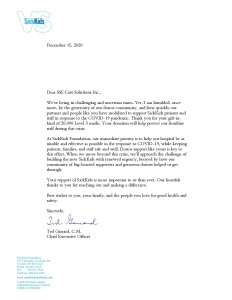Now that a COVID-19 vaccine has been approved in Canada and the first shots are set to be given, lots of you have questions about vaccines: If I’ve previously tested positive for COVID-19, should I still get vaccinated? Is the vaccine safe for pregnant women, children and people who are immunocompromised? Where can I find the ingredients list? Can I choose which vaccine to get? We talked to the experts to get you some answers.
Once someone is vaccinated, do they still have to wear a mask and physically distance?
Dr. Zain Chagla, an associate professor of medicine at McMaster University and an infectious disease physician in Hamilton, Ont., said yes, in the short-term, for two reasons.
The first is, during such a large immunization, not everyone will get vaccinated at the same time. Some will be vaccinated while others are still waiting and need to be protected by wearing masks, physical distancing, frequent hand-washing and other safety measures.
“Plus, it takes time for the immune response to actually build up and kick in,” Chagla said.
Given that the vaccines will be rolled out in a step-wise fashion starting with the most vulnerable populations, the health-care workers who serve them and then scaling up to the general public, Dr. Tasleem Nimjee, an emergency department physician in Toronto, suspects that we’ll see a parallel drawing back on public health measures such as wearing masks and staying apart.
“It’s not going to be a sort of, ‘Now we can all take off our masks,'” Nimjee said on The National’s virtual town hall, Confronting COVID.
Instead, shedding masks will likely be more gradual.
Can you still carry and spread the virus if you’ve been vaccinated?
That’s not something most of the clinical trials were designed to test, said Dr. Michael Gardam, a Toronto infectious disease physician who is currently the senior medical adviser for Health PEI.
In the recently published study on the clinical trial results for the AstraZeneca vaccine, the efficacy against asymptomatic infection was just 27 per cent — suggesting those vaccinated generally can still transmit the disease — but the number of cases was quite small to draw conclusions.
Moderna says it does plan to check if its vaccine prevents more than just symptomatic infection.
Gardam said because it’s something that still needs to be figured out, “for now, getting vaccinated does not automatically mean that you couldn’t potentially pass COVID-19 on to someone else.”
That’s another reason he expects we’ll be wearing masks for a while, he said.
Will those who have tested positive for COVID get the vaccine or will they be deemed to have immunity? Is there any danger if they do get the vaccine?
There’s not enough information yet to answer the first question, said Dr. Isaac Bogoch, an infectious disease doctor in Toronto and a member of Ontario’s COVID-19 vaccine distribution task force.
“But my inkling,” he said, “is that they should be vaccinated.”
Bogoch said there have been reports of people getting reinfected with COVID-19 as soon as four months after recovering from their previous infection, and those are probably the tip of the iceberg. He said he expects most people who have recovered from COVID-19 will be eligible for vaccination.
As to whether getting the vaccine poses a risk to those who have been previously infected, Gardam said no, there is no danger.
He said vaccines are routinely given to people without testing if they have been exposed to the disease, because it’s logistically easier to just vaccinate everyone.
What if only half the population is vaccinated? How much of the population has to be vaccinated to achieve herd immunity?
Herd immunity is the point at which the virus can’t find enough people to infect in order to continue the chain of infection.
Vaccinating half the population probably won’t be enough.
The percentage required to achieve herd immunity depends on how many people a single infected person spreads the disease to on average. For COVID-19, this is thought to be between two and three, so about 60 to 70 per cent of the population will need to be immune in order to achieve herd immunity.
In other words, if a vaccine is 100 per cent effective, then 60 to 70 per cent of the population would need to be vaccinated.
However, the COVID-19 vaccines have been less than 100 per cent effective in clinical trials, and may be even less so in the real world, said Dr. Zain Chagla of McMaster University. That’s because the trials didn’t include people with certain medical conditions, such as cancer, or transplant recipients, to name a couple examples.
So, how effective are the vaccines when they’re given to all kinds of people?
“That’s really what’s going to determine how long it takes to get to true herd immunity,” Chagla said.
Will the Pfizer-BioNTech and Moderna vaccines work for people on chemo or suffering from autoimmune diseases or taking an immunosuppressant drug? Will they be able to take these vaccines?
Bogoch said those conditions are all different, and it’s important for anyone who has them to talk to their doctor about their unique situation.
“But, in general, it’s very likely that those with an immunocompromised state will be eligible for this vaccine,” he said.
It’s possible that they won’t generate the same level of immunity as a healthy person, he said, “but some protection is better than nothing.”
Gardam said there may be concerns about giving a vaccine containing live viruses to an immunocompromised patient, but the Pfizer-BioNTech and Moderna vaccines contain only genetic material.
“There’s nothing live in that. So, typically, people who are immunocompromised can get vaccines like that.”
Could a person get a shot of the Pfizer-BioNTech vaccine for their first dose and the Moderna vaccine for their second?
Right now, you can’t take shots of two different vaccines, Bogoch told CBC News Network.
“If you start with Moderna, you end with Moderna,” he said. “I doubt anything would happen if you mixed and matched, but it’s not going to happen. You shouldn’t be doing that.”
That’s because different vaccines haven’t been tested together yet. However, tests of combinations of different types of COVID-19 vaccines have been proposed for next year, so that could change in the future.
Can I choose one vaccine over another?
“I suspect we won’t have the luxury of doing that, at least in the early stages,” said Dr. Susy Hota, an infectious disease specialist at the University Health Network and an assistant professor of medicine at the University of Toronto.
Quantities of the vaccine will be limited for now.
“We’ll probably have to get whatever’s available at that time,” she said.
Where can I find a list of ingredients for the Pfizer-BioNTech vaccine?
The ingredients are listed on Page 23 of the vaccine’s product monograph. A detailed article about them was recently published in the MIT Technology Review.
In general, you can find the ingredients list for vaccines in the Canadian Immunization Guide or the vaccine’s product monograph available through Health Canada’s Drug Product Database.
Do I still need to take the flu shot if I get the COVID-19 vaccine?
Absolutely, Chagla says.
The reason is, the flu and COVID-19 are caused by different viruses and need different vaccines.
“The time is probably now to get your flu shot in,” Chagla said.
Will we need to take this vaccine yearly like the flu shot?
Dr. Lynora Saxinger, an infectious disease physician at the University of Alberta, said we don’t have an answer yet because immune responses to the vaccines haven’t been studied long enough to know.
Gardam said there’s been a lot of discussion about whether vaccines to protect against COVID-19 will be needed each year.
“The only way we’re going to know that is by following people along over the next nine months to a year to see if they still have good immunity or not,” Gardam said.
I suffer from severe trypanophobia. Is there an oral or nasal COVID-19 vaccine in the works?
Trypanophobia is fear of medical procedures involving injections or needles. Those who suffer from it will be happy to know that a number of oral and nasal COVID-19 vaccines are in development. In fact, there are research groups in Canada working to develop both those kinds of vaccines, and the oral vaccine from Symvivo has begun clinical trials. There is also a nasal spray from Beijing Wantai Biological Pharmacy and Xiamen University that is in Phase 2 clinical trials, according to the World Health Organization’s tracker.
What constitutes a ‘history of serious allergic reactions?’ Once?
Anaphylaxis is a serious allergic response by the body to a substance in a food, medicine or vaccine.
Chagla said people with anaphylaxis can get very short of breath and their blood pressure can drop.
The experience of a single episode that required epinephrine, such as from an EpiPen or other auto-injector, constitutes a “history of serious allergic reaction.”
Dr. Zainab Abdurrahman of McMaster University’s clinical immunology and allergy department said the U.K. regulators temporarily paused delivery of the Pfizer-BioNtech vaccine to people with a history of anaphylaxis after two adverse events occurred among health-care workers with such a history who carried auto-injectors.
Both received the vaccine and then experienced reactions that doctors and regulators call adverse events until any cause-and-effect relationships are sorted out. The two people were treated immediately and recovered without needing to be hospitalized.
“There’s a lot of different kinds of reactions and we need to clarify exactly what happened,” such as what components of the vaccine might be responsible, Abdurrahman said.
The adverse events could be coincidences that weren’t caused by the vaccinations. The events are under investigation and further guidance could come from regulators, Chagla said.
How many vaccines can our bodies tolerate?
Dr. Noni MacDonald, a professor of pediatrics at Dalhousie University who specializes in vaccine safety and communication, said she’s been getting this question for at least 25 years. Vaccines contain antigens — generally viruses, bacteria or parts of them — that trigger an immune response similar to those triggered by the microbes themselves.
“I think what people don’t know is how much we are bombarded by antigens … every day,” MacDonald said. Those include the microbes in your gut, in your food, in the air you breathe. “The amount of antigens that are in these vaccines is extraordinarily limited.”
And such small amounts are not going to overwhelm your immune system, she said.
And as Chagla points out, our bodies are programmed to deal with multiple pathogens and immune triggers at the same time.
“In everyday life, it’s not like every bacteria and virus takes a break because one other bacteria and virus has affected you. You can get a cold and then eat something that gives you food poisoning.”
In fact, infants receive a number of vaccines in a single product.
“We’re able to take multiple vaccines,” Chagla said.
Source: https://www.cbc.ca/news/health/covid-19-general-vaccine-faq-1.5838140
By Emily Chung, Amina Zafar

